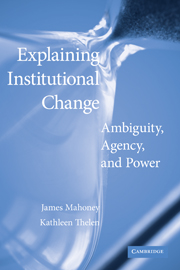Book contents
- Frontmatter
- Contents
- List of Illustrations
- Contributors
- Preface
- Explaining Institutional Change
- 1 A Theory of Gradual Institutional Change
- 2 Infiltrating the State: The Evolution of Health Care Reforms in Brazil, 1964–1988
- 3 The Contradictory Potential of Institutions: The Rise and Decline of Land Documentation in Kenya
- 4 Policymaking as Political Constraint: Institutional Development in the U.S. Social Security Program
- 5 Altering Authoritarianism: Institutional Complexity and Autocratic Agency in Indonesia
- 6 Rethinking Rules: Creativity and Constraint in the U.S. House of Representatives
- 7 Historical Institutionalism in Rationalist and Sociological Perspective
- Index
- References
5 - Altering Authoritarianism: Institutional Complexity and Autocratic Agency in Indonesia
Published online by Cambridge University Press: 05 June 2012
- Frontmatter
- Contents
- List of Illustrations
- Contributors
- Preface
- Explaining Institutional Change
- 1 A Theory of Gradual Institutional Change
- 2 Infiltrating the State: The Evolution of Health Care Reforms in Brazil, 1964–1988
- 3 The Contradictory Potential of Institutions: The Rise and Decline of Land Documentation in Kenya
- 4 Policymaking as Political Constraint: Institutional Development in the U.S. Social Security Program
- 5 Altering Authoritarianism: Institutional Complexity and Autocratic Agency in Indonesia
- 6 Rethinking Rules: Creativity and Constraint in the U.S. House of Representatives
- 7 Historical Institutionalism in Rationalist and Sociological Perspective
- Index
- References
Summary
How Authoritarian Institutions Change
Authoritarianism is rapidly moving from political science's margins to its mainstream. Lisa Wedeen's (1999, 26) observation that there were, “oddly, few recent writings on authoritarianism in comparative politics” rang true a decade ago – but no longer. A growing literature has established that dictatorships are as diverse as democracies, and that this diversity largely rests in these regimes' institutional differences. Contrary to popular images of dictatorships as regimes in which political arrangements and practices constantly shift at the whim of arbitrary autocrats, authoritarian regimes organize politics in ways that can prove surprisingly enduring. No less than in democracies, the orderliness of politics in authoritarian settings is best explained by the robustness of political institutions.
Yet we still know very little about how institutions evolve within durable authoritarian regimes over time. Through a theoretically motivated analysis of Indonesia's authoritarian New Order (1966–1998), this chapter develops a framework for apprehending and explaining incremental institutional shifts under dictatorship. Ostensibly a model of long-term stability, the Suharto regime in fact experienced a gradual but significant transformation of its core institutional features. What started as a system of oligarchic military rule evolved into a highly personalized regime, backed in nearly equal measure by military and civilian organizations.
Explaining why Indonesian authoritarianism underwent such a considerable transformation, while so many authoritarian regimes do not, demands attention to the causal role of institutional complexity in foiling path dependence and expanding opportunities for agentive action.
- Type
- Chapter
- Information
- Explaining Institutional ChangeAmbiguity, Agency, and Power, pp. 132 - 167Publisher: Cambridge University PressPrint publication year: 2009
References
- 7
- Cited by



